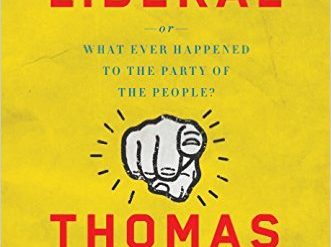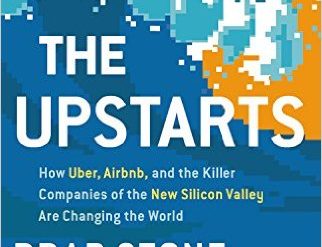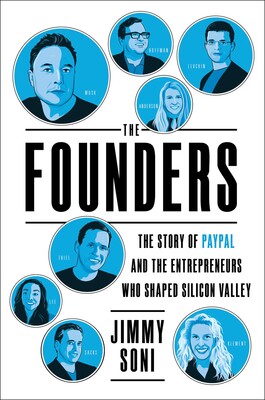
Estimated reading time: 6 minutes
As tech companies go, PayPal is a piker compared to the bold-faced names of the industry. Apple, Microsoft, Google, and Facebook, not to mention Tencent and Alibaba in China, all dwarf PayPal on all the metrics used to measure success in Silicon Valley. What’s truly remarkable about PayPal, though, is the enormous impact its founders — the so-called PayPal mafia — have had in the years following their departure from the company. That’s the story that emerges most vividly from the pages of Jimmy Soni’s “group biography” of the team, The Founders.
A company with many fathers (and mothers)
The cover of the Kindle edition of The Founders features cameo sketches of five men and three women. The implication, of course, is that all eight were “founders.” By contrast, Wikipedia lists seven founders, all men. The iconic 2007 photo in Fortune of the “PayPal mafia” includes 13 people, all men. Elsewhere, I’ve read there were 20 founders. It’s true that a third of the people who worked for the company in its early years were women, and a majority of those in the most senior positions were foreign-born. So, after a fashion, diversity was a fact of life at PayPal. And there were, indeed, many people involved at the outset. But a reading of The Founders makes clear that three men were central to the company’s success: Elon Musk, Peter Thiel, and Max Levchin.
The Founders: The Story of PayPal and the Entrepreneurs Who Shaped Silicon Valley by Jimmy Soni (2022) 496 pages ★★★★☆
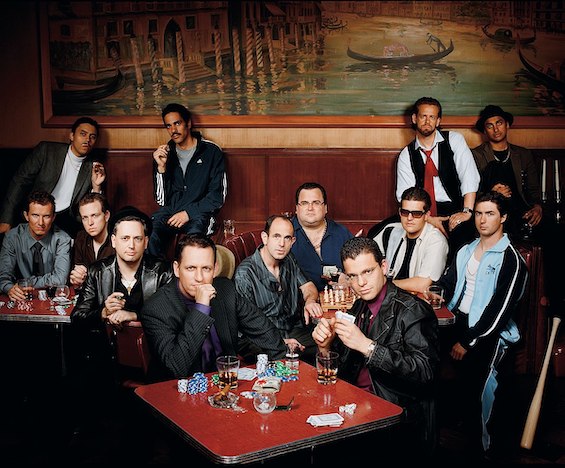
The three principals of the PayPal mafia
Elon Musk
Elon Musk needs no introduction to anyone who’s awake in the United States in 2022. A South African immigrant (by way of Canada), he is routinely identified as the richest person in the world, with a fortune pegged at $270 billion as I write. He’s also famously the man behind Tesla and SpaceX as well as The Boring Company, Neuralink, and OpenAI. (Musk is the founder or cofounder of all these companies except Tesla, for which he serves as CEO and product architect.) And at this writing he seems to have bought Twitter as well. With the possible exception of Jeff Bezos and Steve Jobs, no one has shined as brightly in the technological firmament as Elon Musk.
Peter Thiel
By comparison, Peter Thiel is poor. He weighs in at only number 551 on the Forbes Real-Time Billionaires list, with net worth estimated at a paltry $5.1 billion. However, it’s enough for him to wreak havoc on the American political scene. Thiel is a right-wing libertarian who scorns both political parties and the democratic system as a whole. As I write, he’s in the process of sending enormous campaign contributions to favored reactionary Republican candidates around the country. Although Thiel served as CEO of PayPal during a stretch of its most consequential years, he is not an entrepreneur. Instead, he identifies as a venture capitalist. However, Thiel did found a software company named Palantir Technologies, a $3 billion enterprise with some 3,000 employees. Palantir software is widely employed by federal and state government agencies and major corporations to combat terrorism, computer fraud, and other cyber crime.
Max Levchin
Max Levchin is the least well-known of the three principal cofounders at PayPal. A Ukrainian-American immigrant, he is a software engineer who designed several of the mission-critical features that made PayPal’s success possible. These included, most notably, a novel approach to cyber fraud and a program that was one of the first commercial implementations of the CAPTCHA challenge to identify Internet bots. Since leaving PayPal not long after the company went public, Levchin has founded several companies, including Slide (sold to Google for $182 million). He was an early investor in Yelp and became its largest shareholder. Levchin appears at number 2664 on the Forbes billionaires list with net worth of $1 billion.
How PayPal came to be
At first, there were two companies, not one. It was 1999. Elon Musk was fresh from selling an earlier startup and walking away with $32 million. He poured his newfound fortune into X.com. His goal was to turn the company into an online financial superstore, combining consumer banking, investment banking, insurance, and financial advisory services under one roof.
At about the same time, Peter Thiel teamed up with Max Levchin to form Confinity. After stumbling around in search of a niche, the pair settled on using a new feature on the then-popular PalmPilot. With an infra-red port on a new version of the device, one could beam information from one device to another. Thiel and Levchin decided the answer was to beam money. As an afterthought, both Confinity and X.com offered customers the option to send money by email.
It was only later that both companies discovered how much more popular it proved for customers to send money via email than anything else they were doing. Both then reluctantly decided to shift their focus to email. And when competition between X.com and Confinity threatened to sink both companies, they grumpily merged to form PayPal. The combined firm soon went public, but later in 2002 eBay bought it for $1.5 billion. EBay spun off PayPal as an independent company in 2015. But by then the principals of the PayPal mafia were long gone and well on their way to making history.
Today, eBay boasts 159 million users and a market cap of $32 billion. By contrast, PayPal counts 400 million users—more than 10 times as many—and a market cap of $128 billion. Roughly one out of every 20 people in the world uses PayPal.
About the author
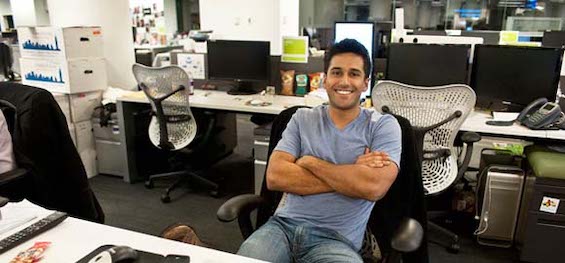
French-American biographer Jimmy Soni is the former managing editor of the Huffington Post. He is best known for A Mind at Play, his biography of Claude Shannon, the founder of information theory.
For related reading
This is one of My 10 favorite books about business history.
I’ve reviewed a biography of one of the PayPal principals: Elon Musk: Tesla, SpaceX, and the Quest for a Fantastic Future by Ashlee Vance (Elon Musk wants to build a colony on Mars (for real)). And you’ll enjoy Burn Book: A Tech Love Story by Kara Swisher (Up close and personal with the billionaire boys of tech).
You might also enjoy:
And you can always find my most popular reviews, and the most recent ones, on the Home Page.

